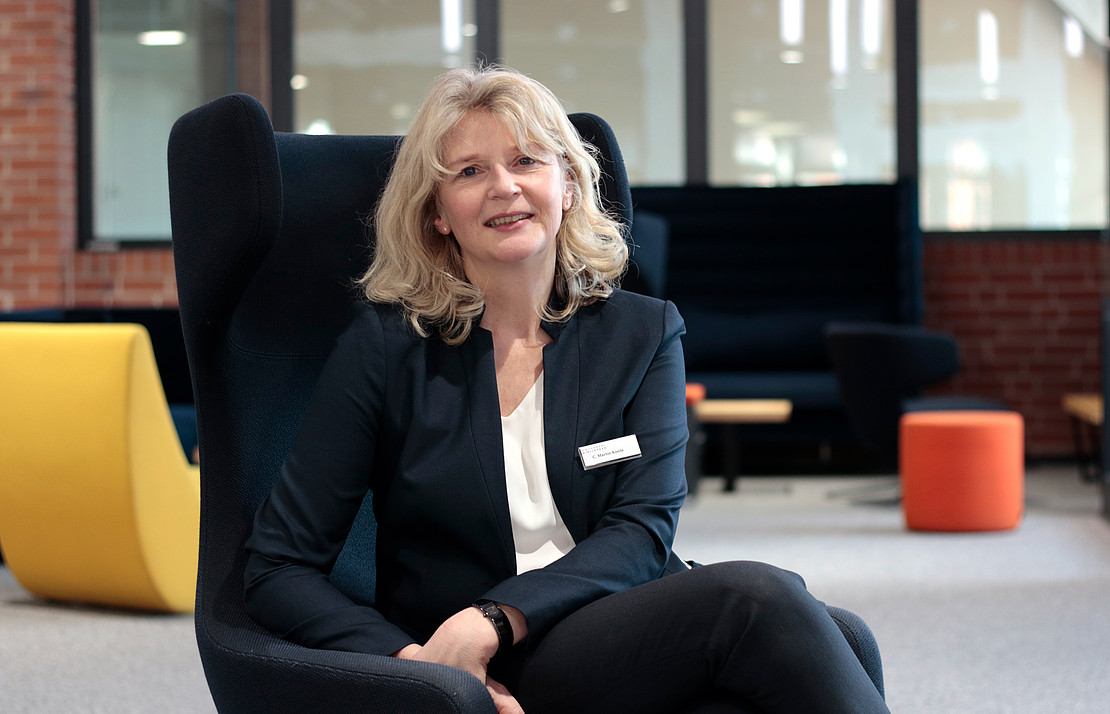This page contains automatically translated content.
"Services for what's coming"

publik: Ms. Martin-Konle, you come from the Berlin State Library, which has just reopened after a 500-million-euro renovation - did you miss the construction noise, or what drew you to Kassel?
Martin-Konle: Indeed, the Berlin State Library's house Unter den Linden has just been officially opened after almost 20 years of renovation. In my position there, I also had to deal with construction issues concerning the two buildings of the State Library. But no, I don't long for construction noise. Construction during operation in particular is often a nerve-wracking undertaking for librarians and users.
publik: Why did you move from Berlin to Kassel?
Martin-Konle: To run my own library in my home state of Hesse was something I couldn't resist. I was already familiar with the Kassel University Library from my time in Giessen; it was always considered to be very agile and dynamic. And I see my expectations confirmed. I'm part of a motivated team that acts flexibly and purposefully - that's my initial experience in view of the current crisis-like circumstances.
publik: What are your plans for Kassel University Library?
Martin-Konle: Libraries are helping to shape the digital transformation. The value of a library is no longer measured by the number of meters of printed books on the shelves, but by access to electronic resources. My particular focus will be on the far-reaching transformation of the scholarly publishing system: The Open Access Initiative, which the university joined early on with its OA policy, means unrestricted and free access to scientific information. Scientific exchange should not be hindered by any payment barriers. The pandemic has just shown us how important fast and license-free scientific communication is. The library promotes publishing in open-access journals by providing advice and, more specifically, through a publication fund that reimburses authors for article fees. We will continue to pursue and expand this: We are currently preparing another DFG application for support for our fund. On a personal note, I am particularly interested in engaging with subject representatives in the humanities and social sciences to discuss reservations about the OA publication strategy. However, my day-to-day work will also be dominated by the two major construction projects ...
publik: The Murhard Library and the Campus Library. What is the latest status here?
Martin-Konle: We will probably start on the third construction phase at Holländischer Platz in the fall, but I can only speculate inadmissibly about the completion date now. I very much hope that we will be able to set up rooms there where students can have a coffee and something to eat. The Murhard Library will probably not be finished until 2023 at the earliest. Unfortunately.
publik: What role will the Murhard Library play in the city?
Martin-Konle: It will be a hinge to the city society: with the Owl Hall, where events will be held again in the future, and the exhibition area, which will become our special showcase. We will think about concepts that convey our special treasures to target groups and thus enable cultural participation. For example, I can imagine school groups working with the manuscripts. Not with the original of the Hildebrandlied, but with the digital copy using special technical infrastructure.
publik: Have you already seen the treasures yourself?
Martin-Konle: Of course I have already been to the vault, that was a special highlight for me. Incidentally, all of this - the event in the Owl Hall, the use of the manuscripts, the digitization - fits into a triad that I see as the motto for my work here in Kassel: openness, networking, sustainability.
publik: Openness here in the sense of being open to the urban society?
Martin-Konle: Yes. But it also includes the topic of open access, the disclosure of research results and data. Networking includes cooperating with other institutions locally, regionally, but also nationally, for example in Grimm research, and making our holdings accessible to researchers around the world through digitization and the provision of metadata. Finally, sustainability: This refers, of course, to operations, the buildings, but also to sustainable education and the long-term archiving of information.
publik: Corona is also shaking up the library. They had to close, were allowed to reopen, had to close again, were allowed to reopen, at least partially. It's onerous for the students and the researchers, and it's certainly not easy for the staff either ...
Martin-Konle: The situation is not easy. You don't close and open a library just like that; it requires advance planning, prudence and a functioning communication strategy. But it is clear to us that we will maintain our services, i.e., the lending desk and our digital services, within the bounds of what is epidemiologically justifiable, as long as the university continues to operate.
publik: What consequences will the crisis have for libraries in the long term? Everything will become more digital, just like elsewhere?
Martin-Konle: Consulting, outreach, library work - all of that will take place digitally in the future, not only, but certainly increasingly. Libraries will buy even more electronic resources. However, the hacker attack on the University of Giessen should be a warning to us! Digitization also makes us vulnerable. Ultimately, the question is: How digital will the universities, will the University of Kassel become? We will offer the appropriate services for what is to come.
Why do we still need physical libraries? And what books should we read this year? You can find a podcast with Ms. Martin-Konle at www.uni-kassel.de/go/podcasts.
Interview Sebastian Mense